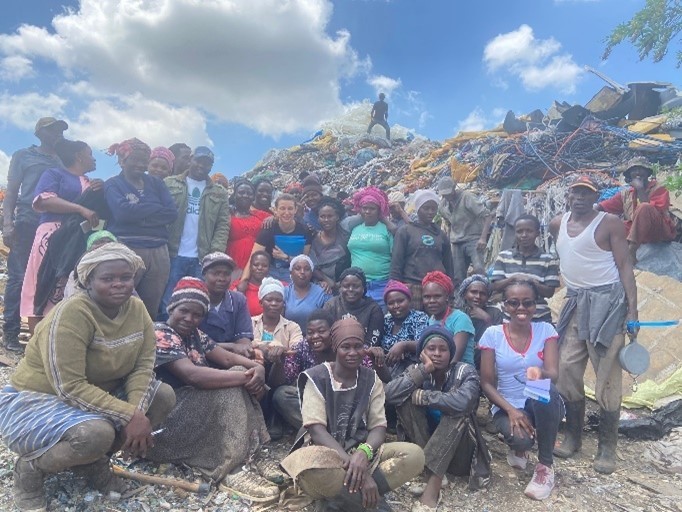Eve Njau
1 February 2023
December in Kenya is usually sunny and seen as a great precursor to the festive holidays. However, this year’s season weather has been uncharacteristically cold or was it expected considering this year’s erratic hot and rainy seasons? But sure enough by mid-morning, the blazing sun makes a determined appearance. Nairobi’s double-faced weather that makes one leave the house as heavy laden as England’s wintry morning but shed these layers hours later in the blistering heat is not unusual in the green city under the sun.

Image: PROCOL Africa team with the informal plastic yard community
It’s against this setting that Alina Marm, Eric Guantai and I traversed the Eastern Nairobi localities of Mukuru and Kayole, 14 kilometers apart, to conduct the first Kenyan urban workshops to unlock what drives prosperity among the informal settlers in the capital’s waste economy.
These workshops will provide Alina with answers on what prosperity means to this community for her PhD study at the Institute of Global Prosperity (IGP) at University College London.
One of the study’s hypotheses is that the plastic waste menace is well recognised, resulting in businesses being under pressure to increase consumer responsibility especially through reusing, reducing and recycling.
The workshops adopted the Theory of Change by evaluating:
• how can prosperity be achieved for the informal plastic recycling ecosystem (IPRE)?
• can co-creation achieve this?
• and if so, what factors in the global circular plastic value chain support this?
We engaged a heterogenous group comprising the informal plastic yard owners, their employees and community members living adjacent to a waste transfer centre.
Interesting insights came up from just simple observations and comparisons before even delving into the rigorous statistical, qualitative and quantitative analyses. A noteworthy trend was the different perceptions of prosperity by individuals, especially employees engaged in the same occupation.
For example, two groups, the Mukuru and the Kayole, perceived different challenges and opportunities despite doing the same job and working in similar physical and environmental conditions. The Mukuru group found the job a good opportunity to earn from the trade, while the Kayole group did not consider it sufficient to meet all their daily needs and would gladly seek other opportunities.
Additionally, the groups’ standpoints revealed interesting views on, for example, whether their work in this informal sector constitutes a sufficient means of achieving prosperity, or, if given the chance, they’d prefer to seek an alternative.
Another dynamic was how the community viewed the nearby waste transfer centre that has organically, albeit illegally, morphed into a dumpsite. With administrative support from the Assistant Commissioner Mr. Michael Were, local leaders articulated their role and deliberated how their communities’ welfare could be enriched in relation to the informal waste sector.
Did it present any environmental, social and aesthetic opportunities or threats to them? Were they equipped to deal with these? Did they have any connections with the people working at the transfer centre? And, most importantly, how did they relate with local or national authorities or civil bodies in having a say in these matters? Would it greatly impact their lives if it were demolished? With the hidden and untapped potential in value creation of plastic waste, did the IPRE offer any opportunities?
Results from these workshops will reveal how societal acknowledgement contributes to recycling’s effectiveness and how this could be improved.
Another interesting comparison will be how rural and urban Kenyan communities view prosperity, for instance which measures are highly valued most by each group, what supports prosperity and the quality of life in each ecosystem in different neighbourhoods.
Eve Njau is a Research Associate at PROCOL Africa, Nairobi, Kenya. A natural capital specialist with a focus in ecosystem services valuation, she’s passionate about seeing communities earn sustainable livelihoods through nature-based solutions and biodiversity conservation
Picture credit: Mark Harpur on Unsplash
Fatemeh Sadeghi
30 May 2024 Feminists in the Global South have stepped out of the conventional territories of ‘women’s matters’ into more fund...